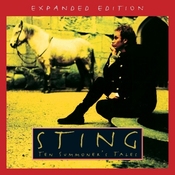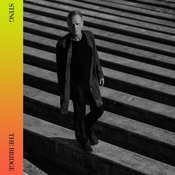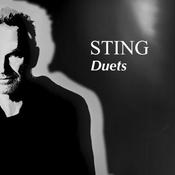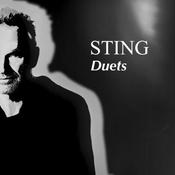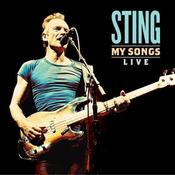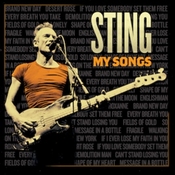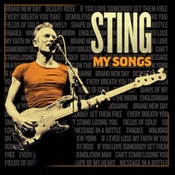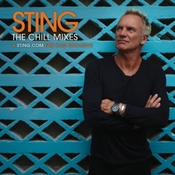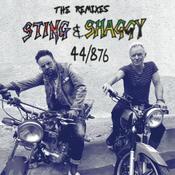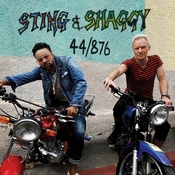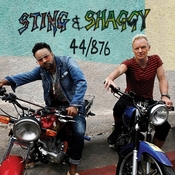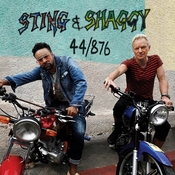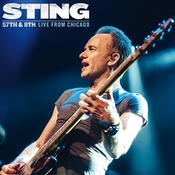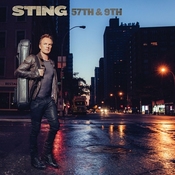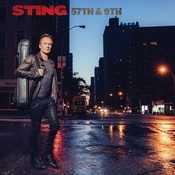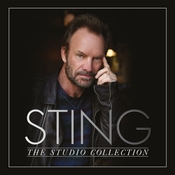The Last Ship (Expanded Edition) CD
- Island Of Souls (2025) lyrics
- And Yet lyrics
- August Winds lyrics
- Practical Arrangement lyrics
- Shipyard (featuring Joe Caffrey, Brian Johnson and Jo Lawry) lyrics
- Ship Of State (featuring Renée Fleming)
- If You Ever See Me Talking To A Sailor (featuring Frances McNamee) lyrics
- Language Of Birds lyrics
- Dead Man’s Boots lyrics
- The Night The Pugilist Learned How To Dance lyrics
- What Have We Got? (featuring Jimmy Nail) lyrics
- The Last Ship lyrics
- It’s Not The Same Moon lyrics
- So To Speak (featuring Becky Unthank) lyrics
- What Say You, Meg? lyrics
- I Love Her But She Loves Someone Else lyrics
- Hadaway lyrics
- Show Some Respect lyrics
- The Last Ship (Reprise) lyrics
- Ballad Of The Great Eastern lyrics
- Sky Hooks And Tartan Paint (featuring Brian Johnson) lyrics
- Peggy’s Song (featuring Rachel Unthank) lyrics
- Jock The Singing Welder lyrics
- O’Brien’s Hymn

Soundbites
Sting will release The Last Ship (Expanded Edition), an updated version of his acclaimed album featuring five new recordings, on December 5, 2025, ahead of a series of highly anticipated international performances of his celebrated musical in which he will also star. The production will be staged in Paris, Amsterdam & Brisbane in 2026, with additional cities to soon be announced.
Available in digital and physical formats—including CD and 2-disc vinyl—the forthcoming album release expands upon the original deluxe edition of Sting’s 2013 solo album with the addition of five brand new, never-before-released recordings, with track listing(s) included below:
Island of Souls (2025)
Shipyard (featuring Joe Caffrey, Brian Johnson, and Jo Lawry)
Ship of State (featuring Renée Fleming)
If You Ever See Me Talking to a Sailor (featuring Frances McNamee)
O’Brien’s Hymn
As a collection, these songs underscore the enduring power of The Last Ship’s narrative and Sting’s deeply personal connection to its themes of home, community, and resilience.
Inspired by the shipbuilding community of Sting’s native Wallsend in northeast England, The Last Ship explores the challenges faced by a town grappling with the loss of its historic industry. The musical premiered on Broadway in 2014, earned a TONY Award nomination for Best Original Score and has since been staged to critical acclaim around the world.
“I literally grew up in the shadow of the yard,” Sting says. “I dreamed of escaping – and I succeeded. But later I realised I had to give something back. THE LAST SHIP is my tribute to the people and the place that shaped me.”
With this expanded edition of The Last Ship, including newly penned liner notes by the 2026 stage production’s book writer Barney Norris, Sting, managed by Martin Kierszenbaum/Cherrytree Music Company, invites listeners to rediscover the album that helped inspire the stage production, now enriched with fresh interpretations and collaborations.
Produced by Sting and Rob Mathes, mixed by Donal Hodgson and 4-time Grammy Award winner Robert “Hitmixer” Orton, The Last Ship (Expanded Edition) will be released globally on December 5, 2025.
"You can't use 30 songs in a musical theatre production. It doesn't need it. So I have a lot of excess songs. And that process is interesting because every song will fight for its life; every couplet fights for its life; every verse fights for its life; every refrain, every bridge. Unless it's moving the story forward, moving the narrative forward, they get rid of it. And that's kind of cruel and painful if you've spent a lot of time writing a song and crafting a song."
Sting, The Journal
"There were no clues in my environment that you leave that environment and fare well and be successful. My parents didn't really understand what my dreams were, they just thought I was crazy, because I had just given up a job with a pension and the security, in their eyes. My dad really didn't understand till the end of his days what the hell I was doing. He though that I should have had a proper job. Maybe he was right. I wanted to take a risk and be a star. I don't know where I got the confidence from. I just got lucky."
Sting, Associated Press
"A good song can last for three minutes and you're just expressing one emotion. You can't have that in the theater. The narrative needs to be advanced as the song is being sung."
Sting, Associated Press
"I used the dialect that I was raised in. I only ever use it now when I threaten people or when I get really angry. My kids would always know I was serious when I start speaking in the weird voice. They're like, 'Uh-oh, he's speaking in that weird voice, he must mean it.'"
Sting, Associated Press
"It's set in my home town.my earliest memory is of a massive ship, we built the greatest, biggest ships ever constructed from planet Earth at the end of my street. I would watch these things grow and I used to wonder if I was gonna have to end up there. I took up music, realised that was a way to escape. Now I have this huge passion and urge, to go back and try and figure out what it was that I was born into because it was quite a surreal landscape and a very powerful and symbolic one, so as an artist it is your duty to return, at least in a creative way and give that place honour."
Sting, CNN
"I wanted... the music to reflect the musical richness of the culture in the North East which was very rich. It has an original Northumbrian music, kind of Celtic. The history of Northumbrian music is very rich. In the 19th century there was a massive Scottish immigration and then a huge Irish immigration so I was brought up in an Irish community, a Catholic community and so that music added to the texture and . of course rock n roll. so this music reflects all of those influences. There is not much rock n roll in it. It's a mixture of folk music and a tip of the hat to musical theatre."
Sting, CNN
"It's a kind of paradox writing about other people but then really ending up writing about yourself and your own conflicted feelings about where you come from. But obviously there are elements of me in it - not least the name. I mean, I chose the name Gideon unconsciously, and it's very close to the name I was given - although no one ever calls me that... I'm hiding in plain sight here. He is an exile, he's very ambivalent about where he comes from. He comes back under duress. And yet he finds himself in the spirit of community, in actually belonging. So yeah, there's something of me there. Not entirely. But there's something of me in all of these characters."
Sting, Irish Independent
"If you are being truthful when you write, all of that just comes out. It's like a stream of consciousness. Like being on Freud's couch. It just comes out when you are telling a story. Which is probably the value of story. It allows us to understand ourselves, our history. I've come from a family of disappointed romantic love and I think that's one of the things I'm sorting out. My parents' marriage was a nightmare and I think that's what I'm excavating. Which is not exactly comfortable."
Sting, Irish Independent
"I'd been wondering whether I'd lost the mojo. But it turns out I just needed to stop writing about me. Once I said, 'OK, I'm gonna tell somebody else's story,' I freed up and the songs poured out in a very quick way. You need to be on input some of the time, to have something to say before you say it."
Sting, The Los Angeles Times
"I was writing songs for other characters than me, other sensibilities than mine, a different viewpoint and so all of that pent-up stuff, all of those crafts I'd developed as a songwriter, I was suddenly free to explore without much thinking, actually. It just kind of came out as a kind of Tourette's, a kind of projectile vomiting. It just came out, very quickly."
Sting, The New York Times
"The history of pop singers going into this field is littered with corpses. Every line fights for its life. Every couplet, every verse, every song, every character is constantly fighting for its life, even now. I'd write a song which I thought was fantastic - a Grammy-winning song! - and they'd say: ‘No, that's not in the play. It's not advancing the narrative. It's just expressing an emotion, and the narrative is static for three, four minutes. You can't afford that length of time.'"
Sting, The New York Times
"I don't think I'm romanticising very much what I experienced as a child of that community I was brought up in. It was incredibly hard and dangerous work. Actually most of the men who worked there ****ing hated it. And yet they had this enormous pride about what they built - this palpable example of their handiwork. So there's this constant ambiguity about the shipyards. They were awful, awful places, and yet they produced the biggest ships in the world, and the whole town was proud of those things."
Sting, The Sunday Telegraph
"The demise of the shipyard became a sort of useful metaphor for the demise of my parents. It had a kind of theatrical mood, but there wasn't a narrative - it was just a mood piece. I decided to have a go at trying to make a story out of it. And I read a story about some shipyard workers in Gdansk in Poland who built their own ship. I just loved that. I thought it was a really wacko, Homeric idea. And I thought: I'll weld that idea to my town."
Sting, The Sunday Telegraph
"The Soul Cages is a strange record, probably my least understood or accepted record, but it has a rolling constituency of the recently bereaved. I get a lot of letters from people who say this record gives them some solace. But then I began to think: I wonder if there's a story that we could tell, that would use The Soul Cages as their starting point and have a narrative, with characters. And this thing coincided with a very dry period for me as a songwriter. You know, I hadn't written songs in about eight years, either because I'd lost the juice or I wasn't inspired or I was afraid... I don't know. I make my living as a songwriter so it's kind of worrying when that well runs dry. And as soon as I began to think of writing for other people, for other voices, for other characters, from other viewpoints apart from my own, this stuff started to flow - because I wasn't in the way any more."
Sting, The Journal
"I was born and raised in Wallsend. It's never been a pretty place. It's a tough place. Nonetheless, I am fiercely proud of it, of being from Wallsend. The ships they built were the biggest ships ever built in the world and yet there was always an ambiguity. It was a tough life those men led. A lot of them hated the yards, but they were fiercely proud of the ships they built with their hands. I lived in Gerald Street, one of those streets leading down to Swan Hunter. That memory of the ship at the end of the street is emblazoned on my memory bank. I’d stand on the pavement and wave my Union Flag as the Queen Mother came down the street in her Rolls-Royce. She actually looked at me. I swear she did. She noticed me.”
Sting, The Journal
“You know Wallsend has had the heart taken out of it. It used to have a coal mine and it had a shipyard. That was all we had and there’s nothing now. There’s are big holes where both things were. At the same time, Newcastle is kind of thriving. It’s a big shopping centre, a big party town and a big university town. But North Tyneside is still depressed and it deserves better, frankly.”
Sting, The Sun
“It was an extraordinary environment to be brought up in. It was such a surreal landscape. These ships would literally blot out the sky. Then to watch a ship launch was a kind of apocalyptic event. You’d never see anything else that size, and the noise of it. The pride in the town was immense. The ships were the largest vessels ever constructed on the planet. The work was incredibly hard, dangerous and unpleasant, yet the workers had something palpable, ‘I did that with my hands’. I think we lack that a bit today. What do we build? What do we make? Obviously the whole community was connected to it. My great grandfather was a North Sea pilot. My grandfather was a shipwright and my father was an engineer in the big engineering works nearby. There were all kinds of master mariners in our family tree going way back.”
Sting, The Sun
“My father would always tell me to go to sea. We’d go to church on a Sunday and he’d take me down to the quayside to see the boats and he would say, ‘Go to sea. See the world’. I did get a seamen’s card but as a musician on a P&O liner. It wasn’t quite what he had in mind.”
Sting, The Sun
"I've written far more songs than would be needed in a musical - about 30 of them. What to do with those other songs? Either they weren't advancing the narrative, or the characters they were written for have evolved into something else. So why don't I present the songs in a sort of revue and bring the audience into that process? Also, by singing them you learn a great deal about how the arrangements need to be finished."
Sting, The Wall Street Journal
"I'm very keen to write earworms, things that will be catchy and will get people to leave the theatre singing. I've done that in my pop career, but at the same time I didn't want to do a rock musical. I wanted to honour the regional music of the place I come from and the tradition of musical theatre. My education wasn't just rock 'n' roll. It was the complete canon of Rodgers and Hammerstein and "My Fair Lady" and "West Side Story." As a kid I ate those records up."
Sting, The Wall Street Journal










